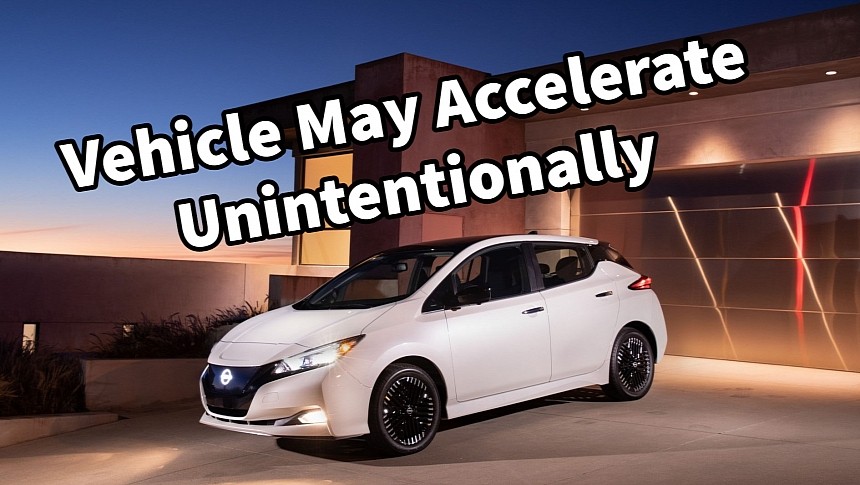Mere days ago, Nissan's Japanese division announced a series of mammoth recalls totaling 1.4 million vehicles worldwide. Of those, a little over 66,000 units of the Leaf are recalled stateside over unintended acceleration caused by the vehicle control module's iffy programming. A total of 66,159 examples are called back in the United States, namely 2018 to 2023 models assembled between September 2017 and March 2023.
The attached report lists a whopping 36 part numbers, representing the VCM ROM data employed in the affected vehicles. Nissan first noticed something off with the Leaf in December 2021 during internal testing of a trial vehicle that decelerated with delay after deactivating cruise control. The Japanese automaker, however, couldn't recreate the condition at that point.
Fast forward to early 2022, and Nissan switched to computer simulations replicating the reported concern. The company identified a sequence of actions causing the reported issue, yet even so, engineers couldn't recreate the condition. After intensive testing, Nissan got closer to the root cause by the fall of 2022.
From the latter part of 2022 through spring 2023, the Yokohama-based automaker finally understood what causes the vehicle to continue accelerating after deactivating cruise control, Intelligent Cruise Control, or the ProPILOT Assist suite of driving assistants. As it happens, the VCM software and a sequence of actions cause the unintended acceleration phenomenon if those actions are completed in under eight seconds.
First and foremost, the aforementioned systems have to be disengaged. The driver then has to shift from drive to B or ECO, or turn the e-Pedal system on. Finally, the driver then has to press the accelerator pedal, then release it. All of this in less than eight seconds. Nissan isn't aware of any claims related to said problem, yet Nissan couldn't rule out the increased risk of a crash.
Dealers have already been instructed to reprogram the vehicle control module with software that doesn't go bananas if the previously detailed sequence is performed in under eight seconds. The update takes no more than half an hour, and the update will be performed at no charge whatsoever to the customer. Owners will be notified by the Japanese automaker by first-class mail from August 30 onward with instructions to bring their vehicles in for the remedy.
The Leaf continues to be one of the most affordable EVs in the United States, with prices beginning at $28,140 – sans destination charge – for the S trim level with the 40-kWh battery. The 60-kWh SV starts at $36,190 and nets up to 212 miles (341 kilometers). The Bolt EV and Bolt EUV are more affordable still, being priced at $26,500 and $27,800 at the present moment.
Another budget-oriented alternative to the Nissan Leaf comes in the guise of the 2023 model year Hyundai Kona Electric at $33,550. Further alternatives include the MINI Electric Hardtop Classic at $30,900, Mazda MX-30 EV at $34,110, and Kia Niro EV at $39,550.
Fast forward to early 2022, and Nissan switched to computer simulations replicating the reported concern. The company identified a sequence of actions causing the reported issue, yet even so, engineers couldn't recreate the condition. After intensive testing, Nissan got closer to the root cause by the fall of 2022.
From the latter part of 2022 through spring 2023, the Yokohama-based automaker finally understood what causes the vehicle to continue accelerating after deactivating cruise control, Intelligent Cruise Control, or the ProPILOT Assist suite of driving assistants. As it happens, the VCM software and a sequence of actions cause the unintended acceleration phenomenon if those actions are completed in under eight seconds.
First and foremost, the aforementioned systems have to be disengaged. The driver then has to shift from drive to B or ECO, or turn the e-Pedal system on. Finally, the driver then has to press the accelerator pedal, then release it. All of this in less than eight seconds. Nissan isn't aware of any claims related to said problem, yet Nissan couldn't rule out the increased risk of a crash.
Dealers have already been instructed to reprogram the vehicle control module with software that doesn't go bananas if the previously detailed sequence is performed in under eight seconds. The update takes no more than half an hour, and the update will be performed at no charge whatsoever to the customer. Owners will be notified by the Japanese automaker by first-class mail from August 30 onward with instructions to bring their vehicles in for the remedy.
The Leaf continues to be one of the most affordable EVs in the United States, with prices beginning at $28,140 – sans destination charge – for the S trim level with the 40-kWh battery. The 60-kWh SV starts at $36,190 and nets up to 212 miles (341 kilometers). The Bolt EV and Bolt EUV are more affordable still, being priced at $26,500 and $27,800 at the present moment.
Another budget-oriented alternative to the Nissan Leaf comes in the guise of the 2023 model year Hyundai Kona Electric at $33,550. Further alternatives include the MINI Electric Hardtop Classic at $30,900, Mazda MX-30 EV at $34,110, and Kia Niro EV at $39,550.
































